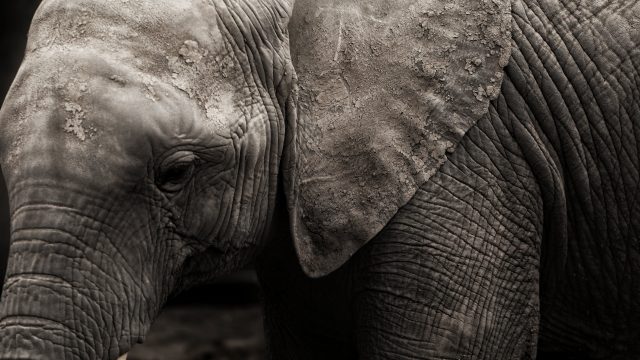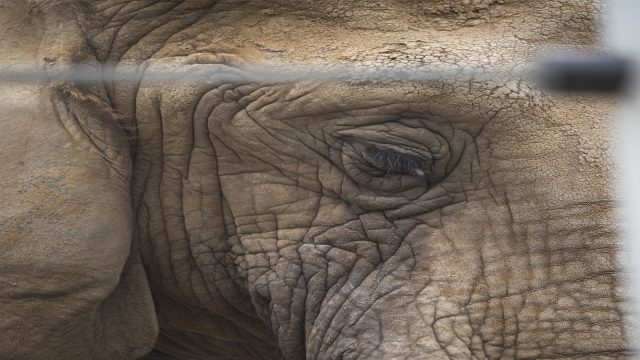
California says Bye-Bye to Bullhooks
The only way to get a multi-ton elephant to perform the ridiculously contrived and unnatural tricks you see in the circus, or to be conditioned to walk in circles to provide rides at county fairs and roadside amusements, is through the constant threat of physical punishment. Elephants do not perform for peanuts. Indeed, exhibitors who use elephants for entertainment brandish a firepoker-like device known as a “bullhook” or “ankus” to strike and jab elephants in the most sensitive parts of their bodies. While the worst abuses take place during training behind closed doors, elephant handlers are never seen without their bullhooks during performances because the mere presence of the bullhook is a reminder to the elephant of the pain that awaits her if she doesn’t do as commanded.
Fortunately, localities around the country have started prohibiting or restricting the use of cruel training tools used to make elephants and big cats dance in circles or jump through rings of fire. It is these local legislative changes that precipitated Ringling Bros.’ parent corporation to end using elephants for its circus—complying with new legislation all over the country was just too complicated for the traveling act which is on the road 50 weeks out of the year. However, in the past month, we have seen states stepping up to do the right thing for elephants, too.
In July 2016, Rhode Island became the first state to enact a statewide bullhook ban when Gov. Gina Raimondo signed legislation prohibiting use of the cruel devices. Just this week, California became the second with Gov. Jerry Brown signed a bullhook ban into law.
Elephant advocates will recall that Gov. Brown vetoed a criminal bullhook ban that passed both houses during the 2014-15 legislative session due to his stated wish not to further complicate the California Penal Code. Bill sponsor Sen. Ricardo Lara tweaked the language of the bill so that violations would be subject to civil penalties, including revocation of any state-issued wildlife permits, rather than criminal prosecution. No time has been lost in the process of making these changes since both included an effective date of January 1, 2018.
Ringling Bros. stopped traveling with elephants in May 2016, and all of the accredited zoos in California use protected contact, a positive-reinforcement style of elephant management that is safer and more humane because handlers never share the same unrestricted free space with elephants—and therefore do not need to use bullhooks. So what impact will SB 1062 have? You may recall that Have Trunk Will Travel (HTWT), the Perris, Calif.-based exhibitor that supplies elephants for movies, weddings, commercials, parties and elephant rides at Six Flags Discovery Kingdom in Vallejo, was captured on undercover video violently abusing elephants with bullhooks and electric shock, including an elephant named Tai who has been used in a number of movies, including Water for Elephants. Since the undercover video footage became publicly available, the Association of Zoos and Aquariums ended its affiliation with HTWT and all county fairs across the State of California where HTWT used to provide elephant rides have cut ties with the company. The language in SB 1062 subject HTWT to civil penalties including revocation of the permits necessary for it to lawfully keep elephants in the state for treating and training the elephants the way it does.
As circuses pivot away from use of elephants, as the curtain is being peeled back on the dark side of animals used in Hollywood, and blockbuster movies like Rise of the Planet of the Apes and television shows like The Walking Dead are opting to use computer generated imaging and animatronics rather than live animals, days are numbered for exploitative companies like Have Trunk Will Travel.
When it comes to elephants, big cats and other exotic animals used for human amusement, abuse is the rule—not the exception—which is why the Animal Legal Defense Fund will continue to urge and support critical legal and regulatory changes that will bring an end to the cruel exploitation of rare and endangered species once and for all.
Related
-
Animal Advocates Urge USDA to Withhold License from Troubled Puerto Rico Zoo
In a letter to the USDA, the Animal Legal Defense Fund and others explain the zoo has repeatedly violated standards of the Animal Welfare ActJune 2, 2021 Press Release -
Animal Advocates Urge Puerto Rico Officials to Take Action on Troubled Zoo
Animal Legal Defense Fund letter asks Puerto Rico governor to investigate illegal treatment of endangered species and other animals at Dr. Juan A. Rivero National Zoological ParkDecember 16, 2019 Press Release -
The Animal Legal Defense Fund Mourns Beulah and Karen and Fights for Change in Massachusetts
The Animal Legal Defense Fund is deeply saddened by the death of elephants Beulah and Karen and is committed to supporting legislation pending in Massachusetts to prohibit the use of elephants and certain other wild animals used in circuses.September 19, 2019 News



